Nutrition plays a crucial role in the success of any fitness program. Whether you are hitting the gym to build muscle, lose fat, or simply maintain your physique, what you eat will significantly impact your results. While exercise focuses on breaking down and rebuilding muscle tissue, it’s nutrition that fuels your workouts, enhances recovery, and ensures you achieve your desired results.
For gym-goers, nutrition is not just about eating enough food but about making the right choices. A balanced diet, rich in essential nutrients, can maximize energy levels during training, support muscle growth, and improve overall health. On the other hand, poor nutrition can hinder performance, lead to fatigue, and delay recovery, ultimately preventing you from reaching your goals.
This article will explore how to build a diet tailored to your workout routine and specific fitness objectives. We’ll discuss the importance of macronutrients (protein, carbohydrates, fats), meal timing, and how to use nutrition to support muscle growth, fat loss, and recovery. By the end of this guide, you’ll be equipped with the knowledge to fuel your body for optimal gym performance and long-term results.
Table of Contents
Section 1: Essential Nutrients for Gym-goers
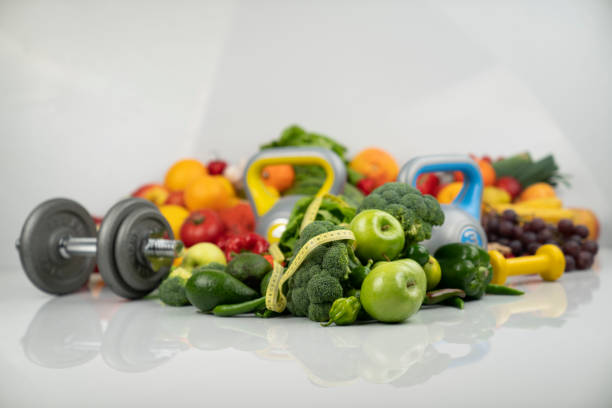
Protein
Protein is often referred to as the “building block” of muscle because of its role in muscle repair and growth. When you exercise, especially with resistance training, your muscle fibers break down. Consuming adequate protein helps repair these damaged fibers and promotes the growth of new, stronger ones. For gym-goers, protein intake is a critical part of daily nutrition.
How much protein do you need? The recommended amount of protein for gym-goers varies depending on the intensity of training and individual goals. On average, most gym-goers should consume between 1.6 to 2.2 grams of protein per kilogram of body weight. For example, someone weighing 70 kilograms would need approximately 112 to 154 grams of protein per day. However, individuals aiming for muscle growth may need to consume on the higher end of that spectrum.
Best sources of protein:
- Animal-based: Chicken, turkey, beef, pork, fish (especially fatty fish like salmon), eggs, and dairy products such as Greek yogurt, cottage cheese, and milk.
- Plant-based: Lentils, beans, chickpeas, tofu, tempeh, and quinoa are excellent sources of plant protein. While plant proteins may be less complete than animal proteins, combining various sources can ensure you meet all essential amino acids.
For gym-goers, it’s essential to spread protein intake evenly throughout the day. Instead of consuming one or two large meals, aim for 4-6 smaller meals or snacks, each containing 20-30 grams of protein, to optimize muscle protein synthesis (the process where your body builds muscle).
Carbohydrates
Carbohydrates serve as the primary energy source for your body during workouts, particularly for high-intensity activities like weightlifting, running, or HIIT (High-Intensity Interval Training). Carbs are stored in your muscles and liver as glycogen, which fuels your workouts. Without sufficient glycogen stores, you’ll likely feel fatigued and unable to perform at your best.
How many carbs do you need? The amount of carbohydrates you need depends on your training volume and intensity. Gym-goers engaged in intense exercise may require anywhere from 4 to 7 grams of carbohydrates per kilogram of body weight daily. For a 70 kg individual, this translates to about 280 to 490 grams of carbs.
Simple vs. complex carbs: Carbohydrates can be classified into two main types: simple and complex.
- Simple carbohydrates: Found in foods like sugar, candies, white bread, and soda, they provide a quick source of energy. However, they can also cause a spike in blood sugar followed by a crash, leading to fatigue.
- Complex carbohydrates: Found in whole grains, sweet potatoes, brown rice, oats, and vegetables, they digest more slowly, providing a steady supply of energy. For sustained performance during workouts, prioritize complex carbs.
For gym-goers, it’s beneficial to consume carbs before and after workouts. Pre-workout carbs help fuel your training session, while post-workout carbs aid in replenishing glycogen stores and speeding up recovery.
Fats
Fats are often misunderstood, but they are essential for overall health and fitness. While carbs fuel your workouts, fats provide a source of long-lasting energy, particularly during lower-intensity or endurance-based activities. Fats also play a role in hormone production (including testosterone, which is crucial for muscle growth) and in absorbing fat-soluble vitamins such as A, D, E, and K.
Types of fats:
- Saturated fats: Found in animal products like butter, cheese, and red meat. These should be consumed in moderation as they can increase cholesterol levels if eaten in excess.
- Unsaturated fats: These are the “good” fats found in foods like olive oil, avocados, nuts, seeds, and fatty fish like salmon and mackerel. These fats are beneficial for heart health and should make up the majority of your fat intake.
- Trans fats: Found in processed foods, trans fats are harmful and should be avoided altogether, as they can increase the risk of heart disease and negatively impact your overall health.
How much fat do you need? Gym-goers should aim to get around 20-35% of their daily caloric intake from fats. For a 2000-calorie diet, this translates to about 44 to 78 grams of fat per day.
Vitamins and Minerals
Vitamins and minerals are micronutrients that, although needed in smaller quantities, are vital for overall health and performance.
- Vitamin B-complex: Helps convert food into energy, crucial for gym-goers needing sustained energy during workouts.
- Vitamin D: Supports bone health and immune function, which is essential for recovery and injury prevention.
- Vitamin C: Plays a role in repairing tissues and promoting a healthy immune system.
- Calcium and Magnesium: Critical for muscle contraction and relaxation. A deficiency in these minerals can lead to muscle cramps and fatigue.
- Iron: Iron deficiency can impair oxygen transport in the body, leading to fatigue and poor performance.
Ensuring you get enough vitamins and minerals from a varied diet rich in fruits, vegetables, whole grains, and lean proteins will support your overall gym performance and health.
Section 2: Pre- and Post-Workout Nutrition
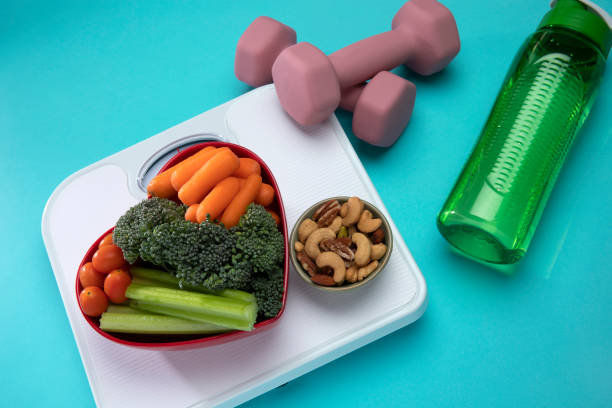
What you eat before and after your workout is crucial for performance and recovery. Consuming the right nutrients at the right time helps you make the most out of each gym session and ensures your muscles recover properly.
Pre-Workout Nutrition
The meal or snack you consume before hitting the gym is critical to fuel your workout. A balanced pre-workout meal will give you the energy and endurance you need for an effective session. This meal should include a good source of carbohydrates to replenish glycogen stores, and a moderate amount of protein to support muscle repair and growth.
Timing your pre-workout meal: You should aim to eat your pre-workout meal 1-3 hours before training, depending on the size of the meal. Eating too close to your workout can lead to discomfort, as your body will still be digesting food while trying to exercise.
What to eat before a workout:
- Carbs for energy: Oats, whole-grain bread, brown rice, and sweet potatoes are great sources of complex carbs that will fuel your muscles.
- Protein for muscle support: Opt for lean proteins like chicken, turkey, eggs, or tofu to give your muscles the building blocks they need for recovery.
- Healthy fats for sustained energy: A small amount of healthy fats from foods like avocados, nuts, or olive oil can provide a longer-lasting energy source.
Sample pre-workout meal ideas:
- Oatmeal with a scoop of protein powder and a banana.
- Whole grain toast with peanut butter and sliced banana.
- Greek yogurt with mixed berries and a handful of almonds.
If you’re short on time and can’t eat a full meal, a lighter snack like a protein bar or a piece of fruit can still provide you with the energy boost you need to power through your workout.
Post-Workout Nutrition
After your workout, your body is in recovery mode. The muscles you’ve worked need protein to repair and grow, and your glycogen stores need to be replenished. This is why post-workout nutrition is just as important as pre-workout.
What to eat after a workout:
- Protein for muscle recovery: Consuming protein post-workout helps repair muscle fibers that were broken down during exercise. Aim for about 20-30 grams of protein after your workout. Fast-digesting proteins, such as whey protein, are an excellent choice because they can quickly supply amino acids to your muscles.
- Carbohydrates for glycogen replenishment: After a workout, your glycogen stores are depleted, and eating carbs helps restore these energy reserves. The amount of carbs you need depends on the intensity of your workout, but generally, aim for a 2:1 or 3:1 ratio of carbs to protein in your post-workout meal.
- Hydration: Rehydrating is essential after a workout, especially if you’ve been sweating heavily. Make sure to drink plenty of water to replace fluids lost during exercise.
Sample post-workout meal ideas:
- Grilled chicken breast with quinoa and steamed vegetables.
- A protein shake with a banana and oats.
- Salmon with sweet potatoes and a side of spinach salad.
The timing of your post-workout meal: Aim to eat within 30-60 minutes after finishing your workout for optimal muscle recovery. This is the window of time when your muscles are most receptive to nutrients, so eating during this period can help maximize recovery and promote muscle growth.
Section 3: Snacks and Supplements
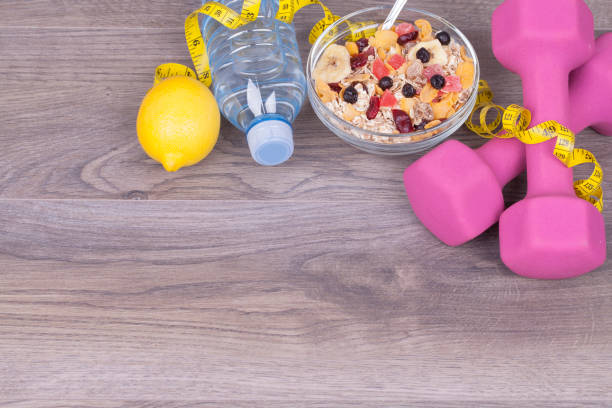
In addition to your main meals, snacks and supplements can play a significant role in supporting your energy levels and ensuring that your body receives the nutrients it needs to recover and grow stronger.
Snacks
For gym-goers, snacks are an excellent way to maintain energy levels between meals and prevent hunger from affecting performance. However, it’s important to choose snacks that are nutrient-dense and support your overall fitness goals, rather than opting for processed foods that are high in sugars and unhealthy fats.
What makes a good gym-goer snack? Ideally, a snack should contain a balance of protein, carbohydrates, and healthy fats to keep your energy levels stable. Here are some snack ideas that are perfect for pre- or post-workout fueling:
- Greek yogurt with a handful of mixed nuts and berries.
- A protein smoothie made with whey protein, almond milk, spinach, and a banana.
- Whole grain crackers with almond butter or peanut butter.
- A hard-boiled egg and an apple.
If your goal is muscle building, make sure your snacks are rich in protein, while those aiming for fat loss might focus on snacks that are lower in calories but still contain protein to preserve muscle mass.
Supplements
For many gym-goers, supplements can provide a convenient way to meet specific nutritional needs or enhance performance. While supplements should never replace whole foods, they can offer support in situations where diet alone may not provide sufficient nutrients.
Popular supplements for gym-goers:
- Whey protein: Whey is a fast-digesting protein that is ideal for post-workout recovery. It’s a complete protein that contains all nine essential amino acids and helps support muscle repair and growth.
- BCAAs (Branched-Chain Amino Acids): BCAAs consist of three essential amino acids—leucine, isoleucine, and valine—that are particularly effective in reducing muscle soreness, enhancing recovery, and preventing muscle breakdown during high-intensity exercise.
- Creatine: One of the most researched supplements, creatine helps increase strength and power output, making it ideal for weightlifting and explosive movements. It works by boosting ATP production, providing more energy during short bursts of high-intensity exercise.
- Fish oil: Rich in omega-3 fatty acids, fish oil helps reduce inflammation, supports heart health, and can aid in muscle recovery.
- Multivitamins: For those who have a hard time meeting their daily vitamin and mineral requirements through food alone, a high-quality multivitamin can ensure you get all the essential micronutrients your body needs for optimal performance.
How to choose supplements: It’s essential to remember that supplements should complement your diet, not replace it. Always consult with a healthcare provider or nutritionist before adding new supplements to your routine, especially if you have underlying health conditions or are taking medication.
Section 4: Nutrition for Specific Fitness Goals
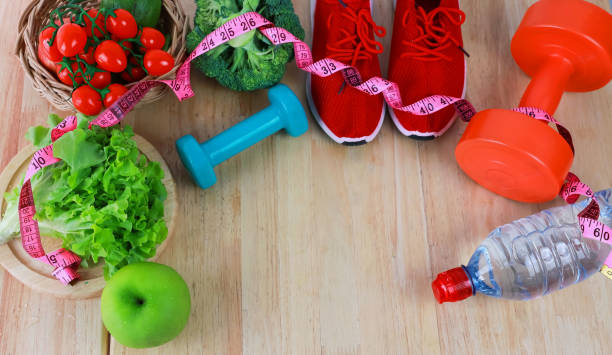
When it comes to nutrition, your specific fitness goals will play a significant role in determining your dietary approach. Whether you’re aiming to build muscle, lose fat, or maintain your physique, the way you eat will differ significantly depending on your objective.
Fat Loss
To lose fat, the most important factor is creating a caloric deficit, meaning you consume fewer calories than you burn. However, you don’t need to drastically cut calories or eliminate entire food groups. Instead, focus on eating nutrient-dense, lower-calorie foods like vegetables, lean proteins, and healthy fats.
How to structure your diet for fat loss:
- Caloric deficit: To lose 0.5 to 1 kilogram per week (a healthy rate of weight loss), you should aim for a daily caloric deficit of around 500-750 calories. Use an online calculator to estimate your total daily energy expenditure (TDEE) and adjust your intake accordingly.
- Protein intake: When dieting for fat loss, maintaining muscle mass is crucial. Aim to consume at least 2 grams of protein per kilogram of body weight to prevent muscle loss. Protein also helps keep you full, making it easier to stick to a calorie-restricted diet.
- Carbohydrate management: While you don’t need to eliminate carbs, it’s essential to choose complex carbs and control portion sizes. Eating high-fiber foods like whole grains, beans, and vegetables can help keep you feeling full while still supporting your energy needs during workouts.
Sample fat loss diet:
- Breakfast: Scrambled egg whites with spinach and a side of mixed berries.
- Snack: A handful of almonds and a boiled egg.
- Lunch: Grilled chicken salad with mixed greens, tomatoes, cucumbers, and a vinaigrette dressing.
- Dinner: Baked salmon with roasted Brussels sprouts and sweet potato.
- Snack: Greek yogurt with chia seeds and a sprinkle of cinnamon.
Muscle Gain
Building muscle requires a caloric surplus, meaning you need to consume more calories than your body burns. In addition to eating more, focusing on increasing your protein and carbohydrate intake is essential to support muscle growth.
How to structure your diet for muscle gain:
- Caloric surplus: To gain muscle, aim for a moderate caloric surplus of 250-500 calories above your TDEE. Eating too many excess calories can lead to fat gain, so it’s essential to monitor your progress and adjust your intake accordingly.
- Protein intake: To maximize muscle growth, aim for 2.2 grams of protein per kilogram of body weight. This protein should come from high-quality sources, and it’s important to spread your protein intake throughout the day to support muscle protein synthesis.
- Carbohydrate intake: Carbs are essential for muscle gain as they provide the energy you need for intense workouts and replenish glycogen stores post-workout. Aim for 4-6 grams of carbohydrates per kilogram of body weight.
Sample muscle gain diet:
- Breakfast: Oatmeal with almond butter, banana, and a scoop of protein powder.
- Snack: Whole grain toast with peanut butter and a glass of milk.
- Lunch: Grilled chicken breast with brown rice and broccoli.
- Snack: Protein shake with mixed berries and Greek yogurt.
- Dinner: Baked salmon with quinoa and roasted vegetables.
- Snack: Cottage cheese with a handful of walnuts.
Muscle Maintenance
For those who have reached their desired physique and are looking to maintain muscle mass while keeping fat levels low, the goal is to eat in line with your TDEE. This means consuming enough calories to maintain your weight, with a balanced intake of macronutrients.
How to structure your diet for muscle maintenance:
- Calories at maintenance: Eating at your maintenance level will prevent you from gaining or losing weight. To maintain muscle, make sure you are consuming adequate protein, at least 1.6-2.2 grams per kilogram of body weight.
- Balanced macros: Ensure you’re getting a balanced intake of protein, carbs, and fats. There’s no need to overeat, but be mindful that you’re providing your body with enough nutrients to support your workouts and recovery.
Section 5: Sample Nutrition Plan
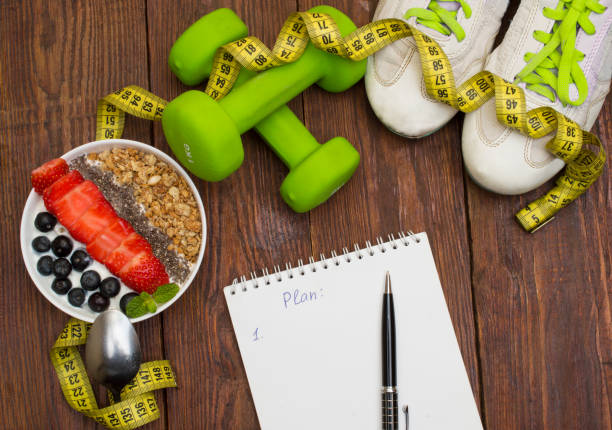
To give you a better idea of how to structure your day, here is a sample nutrition plan for a gym-goer. This plan balances all three macronutrients (proteins, carbs, and fats) and focuses on timing meals around your workouts to maximize energy and recovery.
Breakfast (7:00 AM):
- 3 scrambled eggs with spinach.
- 2 slices of whole grain toast.
- 1 small avocado.
- 1 glass of fresh orange juice.
Morning Snack (10:00 AM):
- 1 apple.
- 1 cup of Greek yogurt with chia seeds.
Lunch (12:30 PM):
- 150 grams of grilled chicken breast.
- 1 cup of brown rice.
- 1 cup of steamed broccoli.
- 1 tablespoon of olive oil.
Pre-Workout Snack (3:00 PM):
- 1 banana.
- 1 protein bar.
Dinner (6:00 PM):
- 200 grams of baked salmon.
- 1 baked sweet potato.
- Mixed green salad with a drizzle of olive oil.
Post-Workout Snack (7:30 PM):
- 1 whey protein shake with oats and berries.
This nutrition plan provides a good balance of nutrients to support a typical gym-goer’s energy needs, muscle recovery, and overall health. It is important to adjust the portion sizes based on your caloric needs and fitness goals.
Conclusion and Important Notes
Nutrition is the cornerstone of achieving your fitness goals, whether you’re aiming to build muscle, lose fat, or maintain your physique. A well-structured diet plan that prioritizes the right nutrients at the right times can make all the difference in reaching your goals. By paying attention to your intake of protein, carbohydrates, fats, vitamins, and minerals, you can fuel your body for optimal performance, faster recovery, and long-term health.
Keep in mind that there’s no one-size-fits-all approach to nutrition. Everyone’s body is different, and factors such as your age, metabolism, activity level, and fitness goals will all play a role in determining your specific needs. Be prepared to adjust your diet over time as you monitor your progress and listen to your body’s feedback. Working with a nutritionist or fitness professional can also be beneficial in creating a plan tailored to your unique requirements.
Finally, remember that consistency is key. It’s easy to get caught up in trends and quick fixes, but long-term success in fitness and nutrition requires patience, discipline, and dedication. By focusing on balanced, nutrient-dense foods and making mindful choices each day, you’ll not only improve your physical performance but also enhance your overall well-being.
Good luck on your fitness journey, and remember that the right nutrition can empower you to achieve your goals faster and more efficiently!
